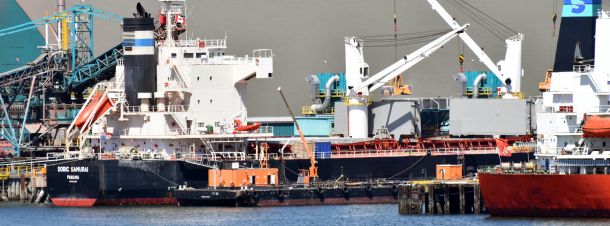
Photo above: The bulk vessel Doric Samurai is one of four bulk carriers which Agrium has received since our last correspondence with the company. Doric Samurai is here seen discharging phosphates from Western Sahara in Vancouver harbour, May 2016. Photo: Rick Voice.
Western Sahara Resource Watch today sent a letter to Agrium Inc, the Canadian large-scale importer of phosphate rock from occupied Western Sahara. Since Agrium first imported from the territory in 2013, it has been the largest importer of phosphates from Western Sahara,
Prelimilary analyses from WSRW show that Agrium so far in 2016 has most probably increased its imports in relation to 2015. In none of Agrium's letters to WSRW, has the company responded to questions relating to the Saharawi people's right to manage their own resources. This is most clear in a letter from Agrium to WSRW on 19 February 2016 as a response to a letter WSRW sent the company on 26 January 2016.
"The available evidence suggests that Agrium has failed to seek the consent of the people of the territory, something underscored by Agrium’s lack of will to respond to questions relating to the seeking of such consent and to questions relating to the legal nature of the territory", WSRW wrote to Agrium today.
The letter also repeats questions that the company has so far failed to respond to:
(1) Would Agrium agree that the people of Western Sahara have a right to self-determination as defined by international law and the 1990-91 referendum agreement of the UN, Morocco and the Frente Polisario?
(2) Does Agrium agree with the conclusion of the International Court of Justice that there are no ties to sovereignty between the kingdom of Morocco and the territory of Western Sahara?
(3) Does Agrium accept the 2015 conclusion of the UN Committee on Economic, Social and Cultural Rights (CESCR) about the principle of the prior, free and informed consent of the Saharawis in relation to the exploitation of Western Sahara’s natural resources?
(4) How will the company assure itself of a credible consent of the Saharawi people prior to any more imports from Western Sahara?
(5) Does Agrium accept the 2015 conclusion of the Court of Justice of the European Union that Morocco has no mandate to administer Western Sahara?
(6) What does Agrium say in reply to the 2015 legal opinion of the African Union about the exploitation of occupied Western Sahara’s natural resources?
WSRW also urges the company "to immediately and unconditionally stop the purchases of phosphates from occupied Western Sahara."
Since the previous correspondence between Agrium and WSRW in January-February 2016, the company has purchased four vessels with a combined volume of about 230.000 tonnes of phosphates. A fifth vessel, Navios Vega, is currently in Rio de Janeiro carrying Western Sahara phosphates, also possibly on the way to Vancouver, around the south tip of South America. This fifth vessel is so far not confirmed for Agrium. With such a trend, the Agrium imports for 2016 will surpass its 2015 purchases.
Read about Agrium's 2015 imports, and the controversies surrounding the trade, in our report P for Plunder. In 2014 and 2015 combined, Agrium imported around 40% more than the second biggest importer from Western Sahara, PotashCorp.
The trend is that fewer and fewer companies registered on international stock-exchanges take part in the trade. Only three such companies are today active: Agrium Inc, PotashCorp and Incitec Pivot. The exports of phosphates is Morocco's biggest source of income from the part of the territory of Western Sahara which it has held under foreign occupation since 1975.
Half the people of the territory live as refugees in camps in Algeria, following the invasion. They see their national wealth disappear while in exile.
Morocco allocates land in occupied Western Sahara to green hydrogen investors
Morocco’s ambitions to become a global green hydrogen powerhouse are accelerating. Yet, Rabat is allocating land in a territory it does not legally own.
US eyes minerals in occupied Western Sahara
Seeking to position itself as a key supplier of strategic minerals for Western powers, Morocco has signed a new agreement with the United States that covers Western Sahara’s waters and the critical minerals harboured there.
TAQA-Moeve obtains land in occupied Western Sahara
Morocco’s push for green hydrogen has taken a decisive step forward - on territory it does not legally own.
EU-Morocco Statement: autonomy without self-determination, law without lawfulness
A joint statement that came out of last week’s EU-Morocco Association Council asks readers to believe in a fiction: that an undefined autonomy plan imposed by an occupying power can satisfy the right to self-determination, and that respect for international law can coexist with the systematic ignoring of the EU’s own highest court.



